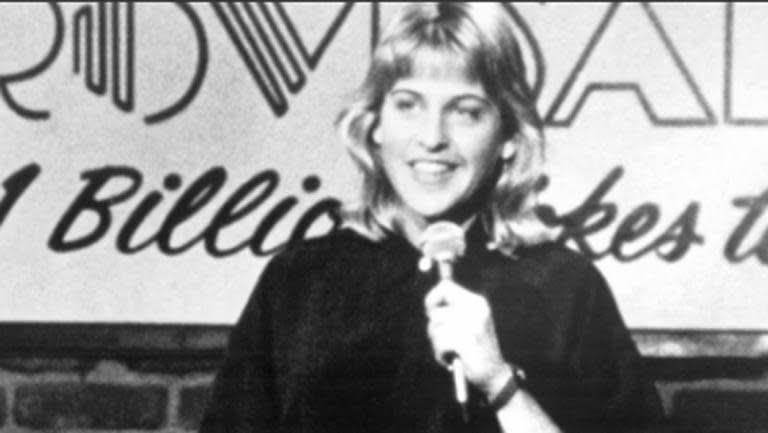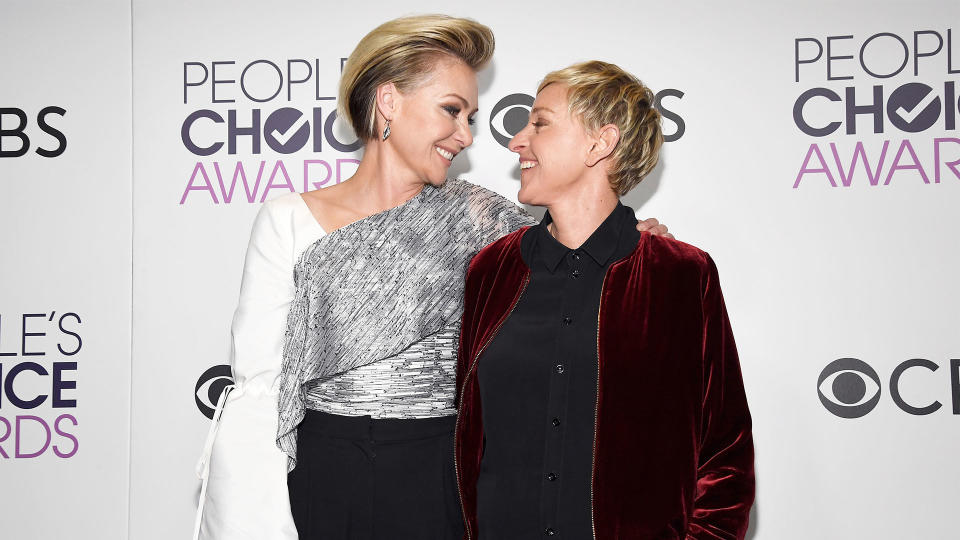Ellen DeGeneres on Coming Out: 'Who's everybody else to tell me that that's wrong?'

She dances daily, makes audiences laugh nationwide, and celebrates individuals for who they are on her talk show. So it's hard to imagine a time when Ellen DeGeneres was burdened by shame.
Before she publicly came out in 1997, "I just was carrying around this sadness inside and this shame of the fact that I was gay when it was like, why am I ashamed of who I am? And who's everybody else to tell me that that's wrong? It's my life," DeGeneres candidly tells MAKERS.
At the time, "to say the words 'I'm gay' came from such a place of shame. It had been just self-hatred and all these feelings that society feeds you on a daily basis to tell you that you're wrong," recalls DeGeneres. "So I just decided I was going to come out, and it was the best thing that ever happened to me."
On Apr. 30 "Susan, I'm gay," said Ellen Morgan on the ABC sitcom "Ellen" in 1997. And in just three words, history was made—Ellen became the first lead character to come out of the closet on national television. The comedian also shared her story on the cover of Time Magazine and on the "The Oprah Winfrey Show."
On Oct. 11, the country continues to celebrate and welcome more stories like DeGeneres' from lesbian, gay, bisexual, transgender, and queer(LGBTQ) individuals to be open about their sexuality on National Coming Out Day.
?? “The most inspiring stories on National Coming Out Day 🌈”https://t.co/yjeiby6iVD
— MAKERS (@MAKERSwomen) October 11, 2018
This year also marks the 30th anniversary of the March on Washington for Lesbian and Gay Rights that garnered nearly half a million LGBTQ individuals and their allies from across the country. According to Human Rights Campaign, one out of every two Americans has someone close to them who is gay or lesbian, while one out of 10 are transgender.
"When people know someone who is LGBTQ, they are far more likely to support equality under the law," says HRC on its website. "Beyond that, our stories can be powerful to each other." However, it is an act that DeGeneres also recognizes as a moment of great vulnerability from her own experience.
"I think I'd said it once to my mother when I came out. You don't walk around saying I'm gay to one another, because, if you're in a gay bar you pretty much— like, nobody just goes over and says 'I'm gay.'" she recalls. But, behind the scenes of the hilarious history-making moment, DeGeneres cried at every rehearsal.
"Every time I would lean forward to the microphone and say I'm gay...I'd sob." Luckily, when the time came to film DeGeneres' groundbreaking and hilarious coming out moment, she had cried it all out— "Thank god," says DeGeneres.
At the time, her unprecedented coming out moment was extremely contentious— while 42 million people gathered to tune in and celebrate this moment in history, the show was later axed by ABC due to the mounting backlash.

After regaining her momentum with the debut of her own daytime talk show in 2003, DeGeneres has done more to promote gay rights. She even announced her engagement to her current wife Portia de Rossi on the Emmy Award-winning show the day after California overturned its ban on gay marriage in 2008. DeGeneres is credited with having "influenced gay rights more than any other celebrity," according to a nationwide survey of 2,000 adults between the ages of 18 and 65 conducted by Variety in 2015.
However, for many people, the "Ellen" episode was a "hail mary for the gay community" inspiring LGBTQ individuals to come out on National Coming Out Day or in their own time.
"I think the reason I can be [an actor] and be openly homosexual is because of Ellen DeGeneres—she's a pioneer," says Glee actress Jane Lynch.
Read more from MAKERS:
? 'About time': Philadelphia unveils first statue of African-American girl
? Fighter pilot Amy McGrath fought against Al-Qaeda. Her new mission is to unseat Sen. Mitch McConnell
Follow us on Instagram, Facebook and Twitter for inspiration on how to ignite passion and action to help accelerate the women’s movement.
